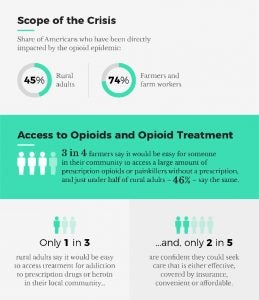September is here, football has started, corn is being chopped and potatoes are being dug. Wisconsin’s soybean and corn crop are rapidly approaching harvest. Wisconsin’s farmers are eager and ready to start the harvest and, in my opinion, this is the best time of the year. However, as we prepare for this exciting time of year, it is also a time to recognize National Farm Safety and Health Week. One of this year’s focus areas is opioid addiction. There is a problem in Wisconsin’s rural towns and elsewhere in rural America. As farmers prepare for long hours in their combines with plenty of time to think, it is important to remember that we may have neighbors who are struggling with and could die from opioid addictions.
What is an opioid anyway? Opioids are a class of drugs that include the illegal drug heroin, synthetic opioids such as fentanyl and pain relievers available legally by prescription, such as oxycontin, codeine, morphine and many others. These drugs are highly addictive and once a person becomes addicted, it can very hard to stop.
In 2017, 883 people in Wisconsin died from an opioid overdose. That number is astounding all by itself, but it becomes even more alarming when it is compared to the fact that 405 people were killed in a car crashes last year. Do the math — 478 more people died of an overdose than on Wisconsin roads.
I am a member of our volunteer fire department. I witnessed a person overdose on heroin. This event took place only a few miles down the road, not far from our farm. It was one of the most emotional things I have witnessed while serving on the fire department. When I arrived on the scene, the person wasn’t breathing. I thought for sure that this person was having a heart attack, but as soon as the EMTs arrived they could tell the individual had overdosed on heroin. The EMTs administered a dose of Narcan. Narcan is a spray that counteracts the effects of an opioid overdose. The individual started breathing almost right away.

As farmers, it can be easy for us to focus on issues that only impact us on the farm, but this is an issue we cannot forget. Remember a person overdosed only a few miles from the farm on which I spend numerous hours driving our combine and harvesting our crops. I often reflect on that incident while harvesting.
One thing that has been working in our county has been starting a Treatment Alternatives and Diversion Program, more commonly known as Drug Court four years ago. Drug Court helps people get treatment and gain support from the very people who may have arrested them and could have sentenced them to jail. This program helps addicts on the road to recovery. Instead of simply locking people up and throwing away the key, the individuals who participate in Drug Court gain support and each day of their sobriety is celebrated.
Drug overdoses and drug addiction isn’t just a big town problem, it is a problem all over our state. If you know someone struggling with addiction, please assist them. That person needs help. I hope I never have to respond to another overdose call. I hope everyone has a safe and productive fall and harvest.
For more information, please visit farmtownstrong.org. This website and campaign was created by the American Farm Bureau Federation in collaboration with National Farmers Union.
Paul Jarvis is a Waushara County (Wis.) Farm Bureau board member and member of the local volunteer fire department. He is a graduate of the Farm Bureau Leadership Institute Class XI.


